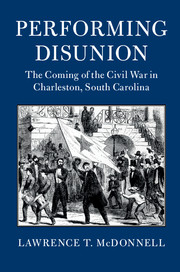Prologue
Published online by Cambridge University Press: 08 June 2018
Summary
On November 19, 1860, Samuel Yoer Tupper wrote to Governor William Henry Gist, offering the services of the Vigilant Rifles for the defense of South Carolina. Defense against what, Captain Tupper's letter never said exactly. But that was hardly necessary.
Across the summer and fall, white Southerners had mulled the probable outcome of the presidential election, imagining catastrophe in countless shapes and forms. With the news of Abraham Lincoln's victory on November 7, decades of dread welled up. “They are downright crazy at the South,” one writer exclaimed, and in South Carolina, “the rankest & most crazy of the disunionists” held the upper hand. “The feeling of indignation and resentment was profound,” Ben Whitner recalled three generations later, “and the Spirit of Secession, as the only alternative for the Southern States, seemed to be in the very air we breathed.”
For thirty years, South Carolina had wavered on the brink of disunion, striving to secure slavery's place in an increasingly antislavery Union. “[A] ll that we ask,” mewled beset masters, “is to be let alone.” Time and again, Carolinians had warned Northerners to stop meddling with their “domestic institutions,” warned Southerners to make common cause in defending their rights. That talk had failed, and disastrous “[e]vents long foretold” seemed soon to sweep slavery's regime to its doom. Now the hated party of “Black Republicans” had been lifted to power. It would control Congress. Its candidate would scheme from the White House. Soon Dixie's fate would be sealed. First, bondage would be barred from the western territories and banished from federal forts and shipyards. The District of Columbia would become free soil. Then the noose would tighten round the South as Yankees grew bolder. How long it would take Lincoln's mob to abolitionize the Supreme Court, none could say, but before that time Republicans would have nurtured a nest of Southern traitors to do their bidding. There was the real danger. “[A] stand must be made for African slavery,” fire- eaters declared, “or it is forever lost.”
- Type
- Chapter
- Information
- Performing DisunionThe Coming of the Civil War in Charleston, South Carolina, pp. 1 - 5Publisher: Cambridge University PressPrint publication year: 2018



